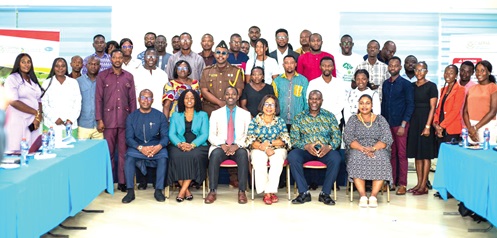About 20 journalists and selected Civil Society Organisations (CSOs) working in the area of health have been educated on the dangers of malnutrition among mothers and children and how they can help curb the situation.
At a one-day capacity-building workshop in Accra on advocating for enhanced leadership and funding for maternal nutrition interventions in Ghana, organised by the Coalition of Actors for Public Health Advocacy (CAPHA), the media was called on to advocate for policies that would help fight the triple burden of malnutrition in the country.
The Director of Operations, CAPHA, Dr Kasim Abdulai, who explained the triple burden to be undernutrition, micronutrient deficiencies and overweight or obesity, gave the underlying causes as weak governance, low funding priority, poverty, food insecurity, poor sanitation, inadequate intake and disease burden.
He said currently, 14 per cent of women do not attend antenatal clinics when they are pregnant, coupled with limited access to healthcare, and lack of awareness leading to low birth weight and pre-term births.
In children, he said factors which lead to malnutrition were low exclusive breastfeeding rates among mothers, inadequate complementary feeding practices and poor dietary in six to 10 children.
Among individuals, he said this translated into delayed cognition and weakened immunity while on the economy it led to a 6.4 per cent gross domestic product (GDP) loss annually and on the society it led to persistent poverty and a malnutrition cycle.
He said for the situation to improve, there was the need to advocate for the country’s nutritional budget to be moved from 0.4 per cent to a more appreciable level while the Ministry of Health also maps out a dedicated nutrition budget solely for improving nutrition among children and nursing mothers.
Inadequate financing
The Deputy Director, Nutrition Department, Family Health Division, Ghana Health Service (GHS), Olivia Timpo, said the major challenges currently being faced by the country in the area of malnutrition was fragmented coordination across government agencies such as school food and nutrition environment, inadequate and unpredictable financing for nutrition, weak implementation and monitoring capacity at sub-national levels among others.
She gave some of the policy and programme gaps in nutrition in the country, including nutrition not consistently reflected in national development plans, outdated guidelines and inconsistent policy implementation, parallel implementation of interventions targeting adolescent girls and pre-pregnancy nutrition, gaps in operational funding for community-level interventions and weak feedback loops between policy and implementation outcomes.
To help advance reforms, she called on CSOs to advocate for greater transparency and accountability in nutrition financing, participate in the review and design of policies and strategic plans, mobilise community voices to influence national priorities, monitor and report on service delivery gaps and build alliances with parliamentarians and the media.
Cross-sector priority
The Executive Director, Women, Media and Change (WOMEC), Dr Charity Binka, said malnutrition was not just a health concern but a national emergency that threatens the country’s development, weakens the workforce and steals the potential of children before they even get a chance to grow.
According to her, the country should not be battling malnutrition because it has fertile lands, capable farmers, national nutrition policies and committed professionals.
However, she said thousands of children suffer, not just from a lack of food, but from a lack of the right nutrition, saying this was not due to scarcity, but to gaps in access, education, services and prioritisation.
Malnutrition, she said, “undermines every effort we make in health, education and economic growth.
It increases healthcare costs and reduces school performance and productivity.”
She called on the government to make nutrition a budgeted, cross-sector priority at the national, regional and district levels.
Writer’s email:rebecca.quaicoe-duho@graphic.com.gh

